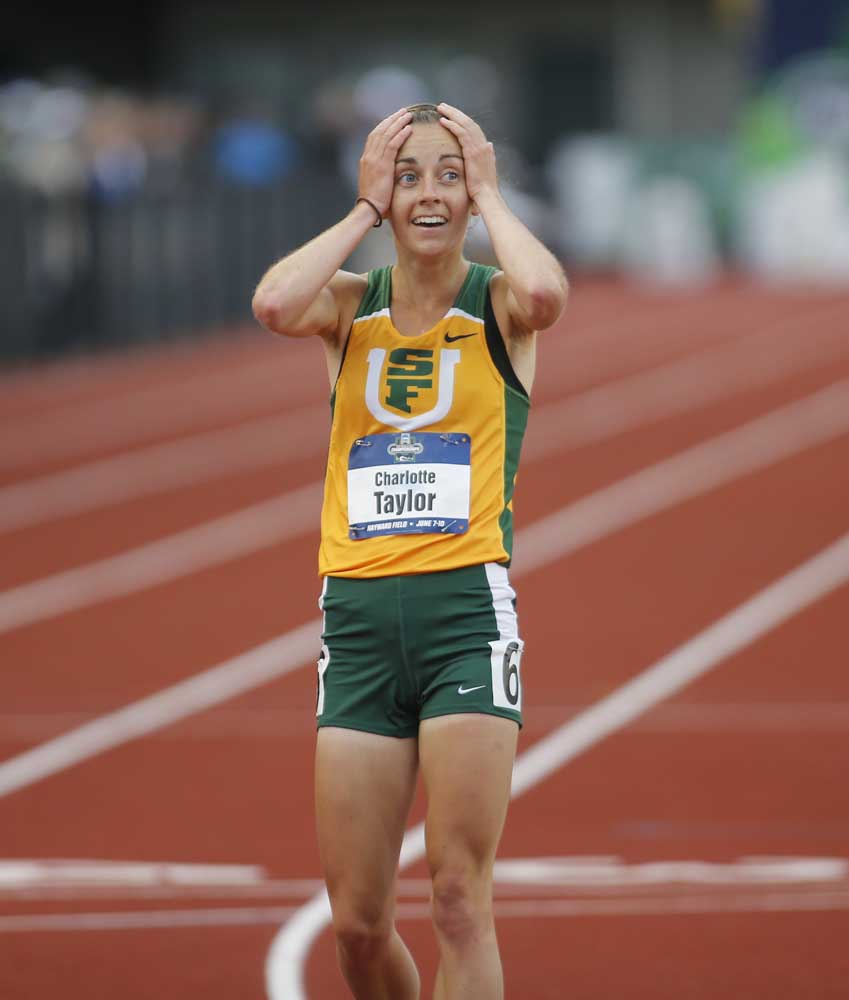Thrills, spills and stories from Eugene
Published 3:52 am Monday, June 12, 2017

- San Francisco's Charlotte Taylor reacts to her victory in the women's 10,000 meters on the second day of the NCAA outdoor college track and field championships in Eugene Thursday. Taylor won the race in 32 minutes, 38.57 seconds.
EUGENE — With any athletic competition there are stories within the big story. Personal and team competitions, disappointments to be exorcised, records to be set and no end of surprises. At this year’s NCAA Track and Field Championships last week in Eugene there was no end to the tales to be told.
Gender Equity. This is Year 2 of a format that gives the two genders their separate stages. In the past years, a few women’s and men’s events would be contested each of the four days of the meet. This year’s competition alternated with the men’s events on Wednesday and Friday while the women had Thursday and Saturday as their stage.
The benefits are numerous for both athletes, coaches and fans. Athletes can have a full day away from the track between the assigned dates, coaches can have that day to speak to their respective teams without having to be in two places at one time, and the fans get to see two championship meets and teams crowned.
Quick Starts. After posting the third fastest time in prelims (38.86 seconds), a quartet of University of Houston men set school and Hayward Field records in the 400-meter relay, winning in 38.34. The next day, the Wildcat Women of Kentucky matched Huston’s performance in the 400 relay, setting field and school records by winning in 42.51.
Double the Fun. Christian Coleman of Tennessee became only the second man to win both NCAA sprint titles winning the 100 meters in 10:04 and the half-lap (200 meters) in 20.25. In the prelim, Coleman set an NCAA record in the century race at 9.82. The other double sprint winner was another Volunteer, 2004 Olympic 100 Gold Medalist, Justin Gatlin. In the field, Filip Mihaljevic won a rare double by taking the shot put title with a toss of 69 feet, 10¼ inches, and followed that up with a University of Virginia school record in the discus at 209-9.
Surprise Firsts. Running the 25 laps of a 10K is a test in perseverance and patience. Showing the best of both, University of San Francisco senior Charlotte Taylor first followed prerace favorite Anna Roher of Notre Dame through 3,200 meters and when Roher fell off the pace, Taylor stayed on the heels of New Mexico’s Alice Wright until the last 400. At that point she powered away with a 68-second lap to secure a six-second victory, 32:38.57 to 32:42.64. The scoreboard monitor showed her crossing the finish line with a huge smile and look of complete surprise. Taylor is the University of San Francisco’s first NCAA Track and Field Champion.
Nerves. Qualifying for the finals in sprint events is a monumental challenge. In the semis there are three heats with the top two finishers and the next two fastest times from all three races moving on to race again. Duck sprint sensations Ariana Washington (defending NCAA champion) and Deajah Stevens placed third and fourth in the first heat. All they could do was wait and watch as times were posted for the other heats. A measure of tension was relieved when the winning time in Heat 2 was slower than their times and Heat 3 proved to be no threat. Both ladies said, “we will correct our mistakes and be ready for Saturday.”
High & Low. Freshmen teammates Emmanuel Korir and Michael Saruni of Texas-El Paso were leading the pack in the 800 when, with a bit less than 200 meters to go, Saruni took a spill. After other runners, with some acrobatic skills, avoided the mishap, he got up and watched as his teammate powered off the Bowerman Curve to capture the win in 1:45.03. To the standing applause of the crowd, Saruni jogged home to finish in 2:15.56. The beauty was in the competition and the crowd acknowledging the heart of Saruni. Ten minutes later, Robert Grant of Texas A&M caught the sixth hurdle in the 400-meter hurdles and took a hard spill. After the other runners had crossed the finish line, Grant got up and jogged across the finish line, knowing that his team was in a tight battle with Florida for the team title.
Family. Sisters Alexis and Victoria Weeks of Arkansas shared the pole-vault runway Thursday, with Alexis placing second and Victoria sixth. During the competition it was announced that both were getting married this summer, Alexis to her high school sweetheart and Victoria to a decathlete on the Arkansas team. Close as they are, it will not be a double-ring ceremony.
Catch me if you can. In the men’s steeplechase, in what can often be a very tactical race in a championship meet, Edwin Kibichly of Louisville took out fast and never relinquished the lead, sending the message early that if you want this championship more than me, you better be ready to race and race hard. Lap by lap he pressed the pace and coming into the penultimate lap he created a gap that none could cover. He won in 8:28.40 with Darren Fahy (Georgetown) and Dylan Blankenbaker (Oklahoma) waging a fierce battle for second, with Fahy holding off Dylan 8:31.08 to 8:31.17.
Next Year. The Oregon men, normally a perennial contender for at least a trophy, if not the team championship, finished a distant ninth. They lacked depth and high-end competitors. The team took a devastating blow when 17-time NCAA Champion Edward Cheserek, who would have been the favorite in both the 5K and 10K races, was pulled from the West Regional qualifying meet with a back strain. Those who did compete did not pull out the usual home crowd-inspired places that would have propelled the crowed to a frenzy and the team to a higher finish.
Redemption. The men’s team race between Texas A&M and Florida came down to the 1,600 relay, last event of the meet. A&M had nipped Florida in the NCAA Indoor Championships by one-half point. Both schools had teams in the 1,600 with seven points separating the Gators and Aggies. Florida needed to finish no lower than fifth to secure the win. The Lone Star State school did all it could by winning the relay in 2:59.98, but Florida worked its magic by coming in fourth at 3:02.16.
Frenzy. With plenty of sprint power the Oregon women were a force to behold. First scorer for Oregon was Katie Rainsberger in the 1,500, as she got the crowd on their feet as four ladies powered down the last 100 meters side by side. Rainsberger wound up fourth to earn 5 points. Continuing on, all was well with the ladies picking up 16 points in the 800 as Raevyn Rogers won her third outdoor title and Brooke Feldmeier, who was not predicted to score in this meet, came in third. In the 100 another 13 points were added. All that happy anticipation changed in a heartbeat when Deajah Stevens, an Olympic finalist in the 200, stumbled and fell some 15 meters from the finish. Ariana Washington added eight points by finishing second in that 200. The crowd was stunned with Stevens’ stumble, but the ladies gathered themselves for the 1,600 relay that gave them their chance to win it all.
Trailing Georgia by 8.5 points, a second-place finish in the relay meant a runner-up finish in the team race. Fitting, it came down to the last 100 meters with Rogers holding off USC anchor Kendall Ellis, 3:23.13 to 3:23.35. Both times were under the collegiate record of 3:23.75 set by Texas in 2004. It was pandemonium for the Duck faithful, yet with protests filed, the team and fans had to wait an hour before all was settled. The wait was worth it.
First. With the win Oregon became the first women’s team to win the Tripe Crown of NCAA Championships in cross country, indoor and outdoor track and field. They were a big surprise in cross country; the indoor title looked like a lock from the start last March; and this latest title took all the competitive zeal the team could muster and thus was so sweet.
Before the last relay, Oregon coach Robert Johnson told the four women “We’re built for this.” He was right, and it appears they are in good stead to win a few more titles.
Neil Branson is an educator and former cross country coach at Seaside High School.









